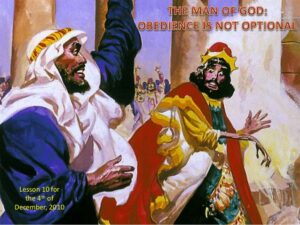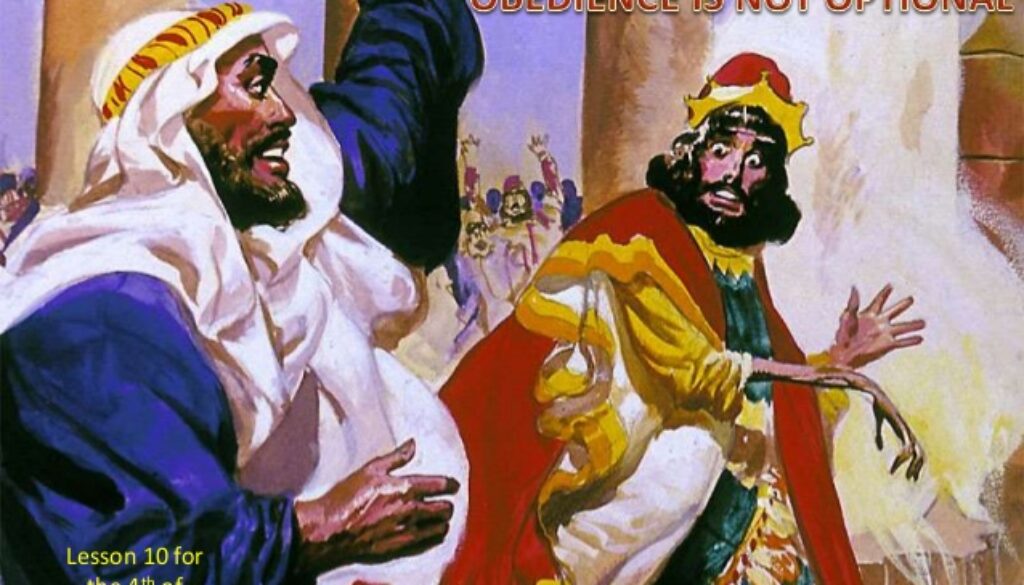1 Kings 13 NOT Acceptable

Jeroboam’s god is NOT acceptable as an option in God’s eyes. God sends His servant to say so. He is tricked int a NOT acceptable act too.
We knew from the beginning that God was NOT going to like what Jeroboam has done. The first commandment should have prevented such an act. But Jeroboam was actively trying to take the people AWAY from God, not help them find another way to serve Him. I think it is fair to assume that he was Satin’s helper in his actions.
God sends a warning to Jeroboam and the people through a prophet. The man did everything right, until another prophet lied to him. Believing the lie cost him his life. I thing the other man should have received the punishment or at least punished also.
Let’s rejoin our story as Jeroboam is confronted. Lead on Holy Spirit, and we will follow.
♥ ♦ ♥
Jeroboam is excited! This will be the first annual feast he ordained for his new god. It is the 13th day of the 8th month and the people are flocking to the golden calves he set up. He will be in Bethel, personally leading the sacrifice. The start of the feast is tomorrow morning.
While the northern tribes of Israel are gathering to prostitute themselves to this false god, the REAL God is speaking to a man in Judah.
“I am sending you to speak against the altar and false gods that Jeroboam has set up for My people in Bethel. I will fill your mouth with the words to say. Once you have spoken them in My name, return to your own territory by another way. ‘You shall neither eat bread nor drink water nor return by the way that you came’” (1 Kings 13:9)
“I will obey Your words O Lord. This I swear.”
Morning dawns and Jeroboam is standing beside the altar he has erected. He raises his hands in praise to his god. Then he calls out to the people.
“Bring all your offerings forward, for your god is ready to receive them!”
The people begin bringing their sacrificial lambs towards the altar. At that same moment the man from Judah begins to call out in a loud voice.
“O altar, altar, thus says the Lord: ‘Behold, a son shall be born to the house of David, Josiah by name, and he shall sacrifice on you the priests of the high places who make offerings on you, and human bones shall be burned on you’” (1 Kings 13:2).
The people begin looking around to find the one who has spoken. When all eyes are on him, the man continues.
“This is the sign that the Lord has spoken: ‘Behold, the altar shall be torn down, and the ashes that are on it shall be poured out’” (1 Kings 13:3).
Jeroboam is furious! How dare this man come against him. He points at him and orders his guards; “Seize him” (1 Kings 13:4b).
Before the sound of his command even fades, another sound emerges from him. It is a strangles cry. Jeroboam’s hand withers and becomes rigid. He can’t even draw his arm back to his side.
People gaze in fear at Jeroboam’s arm. Then another sound sends them scrambling for cover. It is a loud crushing sound accompanied by sounds of ripping as though a great fabric is being torn in two as the altar beside Jeroboam implodes on itself and crumble in pieces. The ashes on the altar spill out all over the ground and nothing remains but rubble.
The people are running and screaming, trying to get as far away from this obvious act of God as possible. Jeroboam also recognizes this act for what it is, but he is more concerned with his own physical deformity to flee the area. Instead, he approaches the man of God and asks of him a favor.
“Entreat now the favor of the Lord your God, and pray for me, that my hand may be restored to me” (1 Kings 13:6).
The man is more than willing to do as Jeroboam requested, for it is another way for the Lord to prove that HE is the one responsible for ALL that has transpired here today.
“Lord God of Abraham, of Isaac, and of Jacob. You have called Israel as Your own, but many have turned and walked away, seeking other gods. Show Yourself as supreme above ALL gods by restoring the hand of Jeroboam.”
As soon as the words left the man’s lips, Jeroboam’s hand and arm are restored to full function. Jeroboam carefully examines his hand, in awe of the Lord’s power. He decides to honor the man with a reward.
“Come home with me, and refresh yourself, and I will give you a reward” (1 Kings 13:7).
The man doesn’t hesitate even for a moment before answering Jeroboam. “If you give me half your house, I will not go in with you. And I will not eat bread or drink water in this place, 9 for so was it commanded me by the word of the Lord, saying, ‘You shall neither eat bread nor drink water nor return by the way that you came’” (1 Kings 13:8-9).
Jeroboam is angered by the man’s response, but he does NOT question or detain him. He has already suffered greatly for trying this tactic. Jeroboam watches as the man walks away.
Two of those present at the time of this demonstration by the Lord are sons of an old prophet who lives in Bethel. They immediately go to the house of their father and tell him of what has happened. As soon as they finish their story their father jumps up begins questioning them.
“Which way did he go?” (1 Kings 13:12).
The sons pointed out the direction they had last seen the man traveling in. The man grabs his outer coat and tells his sons; “Saddle the donkey for me” (1 Kings 13:13).
The donkey is ready in minutes and the old prophet mounts him and rides as fast as he can in the direction his sons indicated. It isn’t long before the old man prophet spies the man sitting under a tree. He pulls his donkey to a halt and dismounts. From a few feet away the old prophet addresses the man.
“Are you the man of God who came from Judah?” (1 Kings 13:14b).
“I am” (1 Kings 13:14c) replies the man.
The old prophet nods. “Come home with me and eat bread” (1 Kings 13:15).
“I may not return with you, or go in with you, neither will I eat bread nor drink water with you in this place, for it was said to me by the word of the Lord, ‘You shall neither eat bread nor drink water there, nor return by the way that you came’” (1 Kings 13:16-17).
The old prophet’s sons had told him of the man saying this to King Jeroboam. He would not accept that answer though, so he lied to the man.
“I also am a prophet as you are, and an angel spoke to me by the word of the Lord, saying, ‘Bring him back with you into your house that he may eat bread and drink water’” (1 Kings 13:18).
The man was hungry and thirsty. He knew what the Lord had said to him, but he eagerly believed what the old prophet said. He does not seek the Lord at this point. Instead, he rises from under the tree and accompanies the man back to his home.
As both men are sharing a simple meal, the Lord speaks through the old prophet to the man. “Thus says the Lord, ‘Because you have disobeyed the word of the Lord and have not kept the command that the Lord your God commanded you, but have come back and have eaten bread and drunk water in the place of which he said to you, “Eat no bread and drink no water,” your body shall not come to the tomb of your fathers’” (1 Kings 13:21-22).
The man bowed his head in shame. “I should have know better” he tells himself. As there is no point in leaving before finishing the meal, the man remains where he is until his hunger and thirst are satisfied.
Feeling responsible for the man’s trouble, the old prophet saddles his own donkey and gives him to the man. “Take him. He is a good donkey and he will serve you well, for as long as the Lord allows.”
The man takes the donkey and sets off again for his home. He is in no hurry and he is feeling the weight of his decisions. Out of nowhere leaps a lion! He knocks the man to the ground, killing him in an instant. The most amazing thing ever seen happens next.
The man’s body lies in the road with the lion standing on one side of him and the donkey on the other! The lion makes no move to tear the man or the donkey. He is content where he is.
This sight is so unusual that it grabs the attention of those who pass by. NONE dare challenge the lion, but they tell the story to all who will listen. Word spreads like wildfire and the old prophet hears the story too. He knows immediately who the man is. He calls out to his sons again.
“Saddle the donkey” (1 Kings 13:27).
Once the donkey is ready, the old prophet goes to the place where the story indicated the man’s body lay. He easily spots the lion and the donkey, standing quietly beside the crumpled form of the man.
The old prophet shows no fear of the lion as he retrieves the body of the man. He takes the reins of the donkey and leads him over to the side of the road. Once away from the lion, the old prophet ties the man’s body across the back of the donkey he had ridden on.
The old prophet returns to his own home and buries the man in his own tomb.
“Alas, my brother!” (1 Kings 13:30) he cries out as the man’s body is laid to rest. He then turns to his sons and says; “When I die, bury me in the grave in which the man of God is buried; lay my bones beside his bones. For the saying that he called out by the word of the Lord against the altar in Bethel and against all the houses of the high places that are in the cities of Samaria shall surely come to pass” (1 Kings 13:31-32).
The story of the death of the man and all that surrounded it reaches Jeroboam. But it does nothing to deter him from drawing Israel deeper into idolatry. He makes even more high places and ordains ANYONE who wants to serve as priests for those high places. He spends the rest of his life and reign on the WRONG side of the Lord.
(to be continued)
I feel for this prophet from Judah. I probably would have fallen for the lie too. I bet he wished he would have checked with the Lord first, AFTER he heard his fate. The fact that he was not torn by the lion says that God understood that he didn’t intentionally sin; or at least it does to me. God allowed him dignity in death. I think it was probably also meant as a lesson to the old prophet. God could have easily, and rightfully, judged him for his lies.
God does NOT want us to fall for the words that people proclaim. If it doesn’t line up with HIS words, it is a lie. RUN the other way. Even if it is someone you think speaks for the Lord, if it contradicts His word, it is NOT from Him. Be willing to dig deep, and go back for clarification if in doubt. I like Gideon’s ‘fleece laying’ method. It seems to work for me, whenever I’m in doubt.
Father God, thank You for Your stories. Thank You for Your word and direction in my own life. I pray that I am walking where You would have me to go.



